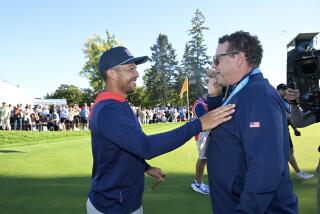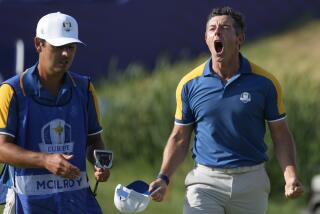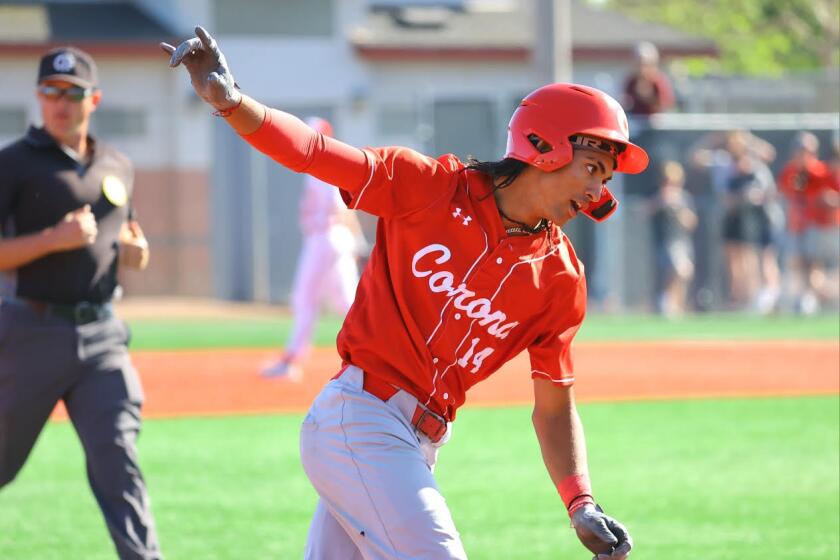Europeans Say It’s a Gimme: They’re Best in World : Ryder Cup: U.S. golfers have not won the event since 1983, but they refuse to say they are now the underdogs.
- Share via
KIAWAH ISLAND, S.C. — One night in 1959, the British Ryder Cup team boarded a Convair turboprop in Los Angeles for the short hop to Palm Springs, where the biennial matches against the United States were scheduled to be played at Eldorado Country Club. Turbulence was expected near Mt. San Jacinto, so the pilot advised the passengers to keep their seat belts fastened.
Suddenly, the plane became sandwiched between two storms, which hurled the plane up and down and eventually back to Los Angeles, where a violently sick group of British golfers and reporters was then bused to Palm Springs.
The most harrowing moments in the air came when the plane suddenly dropped 4,000 feet, prompting this analogy from golf reporter Ron Heager: “It was like falling in a giant lift when the cable snapped, only your stomach stayed on the 10th floor.”
Heager’s words could be used to describe what befell the U.S. Ryder Cup team in the latter half of the 1980s.
The Americans’ domination of golf was first shaken in 1985, when they lost the Ryder Cup for the first time in 28 years. It was a European victory that was considered a nice change by some. But Europe’s repeat showing in 1987, at Muirfield Village in Dublin, Ohio, emphasized that a real shift had occurred: No longer did the United States have the best golfers in the world.
Then, in 1989 at the Belfry in Sutton Coldfield, England, the Ryder Cup matches ended in a tie, allowing the defending champion Europeans to retain the trophy.
Yet, the 12 players here to represent the United States when the 1991 Ryder Cup matches begin Friday will not even hint that they are underdogs. This U.S. team says it is still on top--only its record has fallen. And while the American golfers have not issued a proclamation that they are No. 1 in the world, neither will they admit to being No. 2, regardless of the number of ways or times a European reporter may ask, or how often a European player publicly chides them for taking this attitude.
Before the European team boarded the Concorde Monday in London for the flight to the United States, Nick Faldo told the Associated Press: “The Americans still won’t recognize that we are No. 1. Perhaps if we can hit them again, they might accept the truth.”
Masters champion Ian Woosnam added: “The Americans still think they have the best players in the world. But we have dominated the game for five or six years. We want to prove again that we are the best.”
These attacks, however, have not been countered by the Americans, perhaps as part of the game plan formulated by U.S. team Captain Dave Stockton, who said his team will do its talking with golf clubs this weekend on Kiawah Island’s demanding Ocean Course.
The most that has been said by U.S. players, with any inflection anyway, was that the 1989 Ryder Cup was tied on European soil. It was not lost.
“(There were) some very diplomatic answers (on this subject) from the team yesterday,” Stockton said. “But you better not say anything you can’t back up. We can’t say very much because we haven’t played well the last three times.
“I’ve been puzzled after reading the Europeans’ comments about them wanting respect, about them being No. 1 and us No. 2, and I knew I would have to figure out how to respond to it. . . . Well, to a certain level, we are out here for respect. Whoever wins this leaves here deserving of it.”
So, the 1991 Ryder Cup is important for both sides, a fact recognized by golf fans. In the event’s 64-year history, this is the first sellout in the United States. There will also be 21 hours of live television coverage in this country, more in Europe.
U.S. player Payne Stewart said that second place won’t cut it. “None of us will be happy if we finish second,” he said.
Insignificant now is the dominating record of the United States since this event began in 1927: 21 victories, five losses, two ties. Important now is the record in the six competitions since 1979, when the British and Irish squad was expanded to include players from the rest of Europe: The United States still leads, 3-2-1.
“This is not going to be a war. It is going to be a competition between two continents to see who is better, that’s it,” Spain’s Seve Ballesteros said, in an apparent attempt to deflate the hype surrounding this event.
European team captain Bernard Gallacher, who has played on eight Ryder Cup teams, does not understand the big deal others are suddenly making of these matches. Europe, he said, has always made a fuss about winning the Cup.
“Last night, I was surprised how the American PGA kept talking about how important this Ryder Cup is,” Gallacher said. “The 1969 match (the first Ryder Cup Gallacher played in) was important, as they have all been to the Europeans. We had huge crowds when we were here in 1971 at St. Louis, so it is not like (the Ryder Cup) caught on all of a sudden.
“You (Americans) must have lost it somewhere along the line.”
More to Read
Go beyond the scoreboard
Get the latest on L.A.'s teams in the daily Sports Report newsletter.
You may occasionally receive promotional content from the Los Angeles Times.










